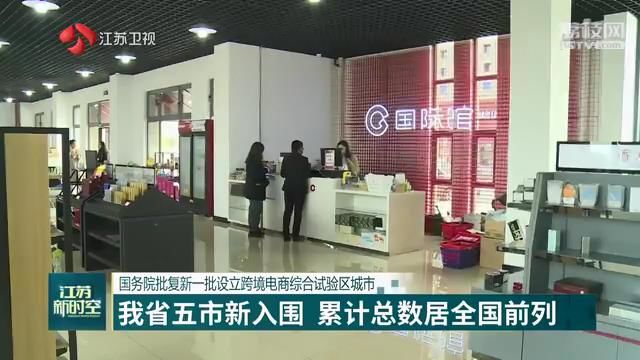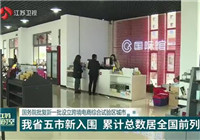Five cities from east China’s Jiangsu province are among the 46 cities and areas that have been approved by the State Council for the establishment of integrated pilot zones for cross-border e-commerce.

The five cities from Jiangsu are Changzhou, Lianyungang, Huai’an, Yancheng and Suqian.
In Suqian E-commerce Industrial Park, the offline experience store of e-commerce company "JD International Pavilion" opened during the Labor Day holiday. With imported cosmetics, snacks and toiletries gaining growing popularity with online customers, the store has been authorized by 37 brands in China through cooperation with cross-border e-commerce companies in bonded areas in Zhengzhou and other places. Currently, the JD International Pavilion sells 176 online brands with its sales volume hitting 23.98 million yuan in 2019.
Wang Xiaoqing, head of JD International Pavilion
Previously, we cooperated with cross-border e-commerce companies in bonded areas in Zhengzhou, Hangzhou, Shanghai and other places. We very much look forward to the construction and development of the integrated pilot zones for cross-border e-commerce in Suqian, so that we can expand our cross-border business more directly and save the cost of logistics warehousing and human resources.

After being approved as a provincial cross-border e-commerce pilot city in 2016, Lianyungang has successively cultivated two major national-level foreign trade transformation and upgrading bases in medicine and silicon materials, and launched a comprehensive cross-border e-commerce service platform. The establishment of a comprehensive cross-border e-commerce pilot zone will attract more outstanding suppliers and mature supply chains, and gather more cross-border e-commerce platforms.
Cui Wanping, deputy director, office for port administration, Lianyungang
The integrated pilot zone for cross-border e-commerce is conducive to the ongoing efforts for epidemic prevention and controlstable foreign trade, and resumption of production. To this end, we will seize this development opportunity improve the specific implementation plan as soon as possible, introduce support policies and cooperate with the free trade zone so as to complement each other's advantages
At present, the traditional mode of foreign trade is severely affected by the COVID-19 epidemic. Cross-border e-commerce can break through time and space restrictions, reduce intermediate links, bridge the supply and demand, and provide new development opportunities for more countries, enterprises and groups.
With five expansions, the integrated pilot zone for cross-border e-commerce has included ten cities from Jiangsu.
Under the current situation, the vigorous development of cross-border e-commerce in the comprehensive experimental area will foster a new format for foreign trade in Jiangsu, accelerate the transformation and upgrading, and expand imports to meet consumer demand.
Yang Kaiping, CEO of Yancheng Senasi Information Technology Co., Ltd.
The establishment of the pilot zone has created a good business environment for the establishment of our corporate brand and participation in market competition, and has also strengthened our confidence in foreign cooperation in trade. We have seized the global e-commerce opportunities and started to expand markets in Southeast Asia, Japan and South Korea in the hope of registering 5 million US dollars of cross-border sales this year.
The State Council released a circular on May 6, approving the establishment of integrated pilot zones for cross-border e-commerce in 46 cities and areas, including the Xiongan New Area.
As required by the Communist Party of China Central Committee and the State Council, the new zones should adhere to new development concepts and draw experience from existing zones to drive industrial upgrading and transformation, boost brand building, and propel cross-border e-commerce across the board.
The move will help stabilize the fundamental landscape of foreign trade and investment, and catalyze higher-quality development of trade, said the circular.
To create a fair and sound business environment for various market entities, the zones should be well regulated in terms of national security, quality of imported and exported commodities, and transaction risks, among others.






